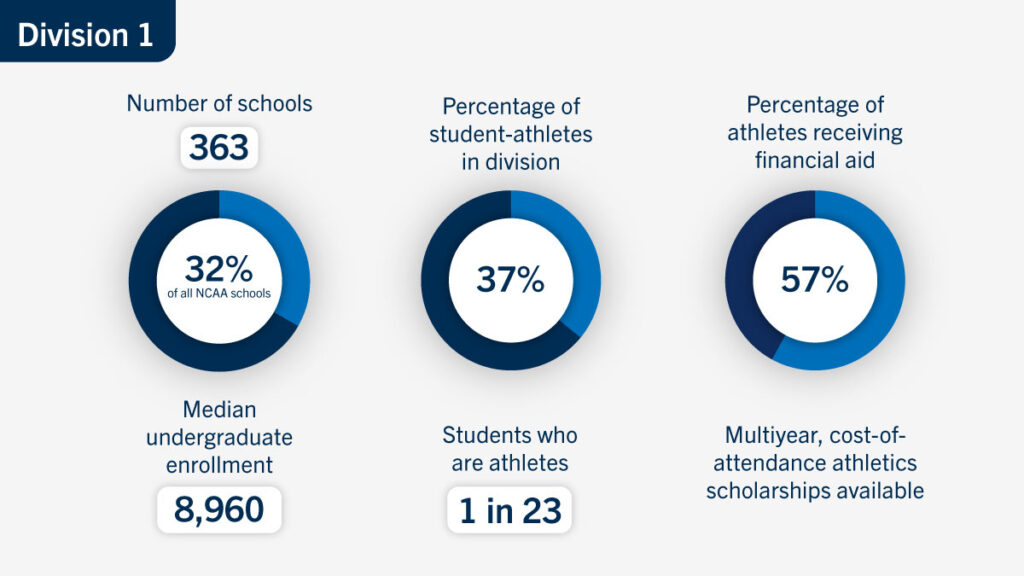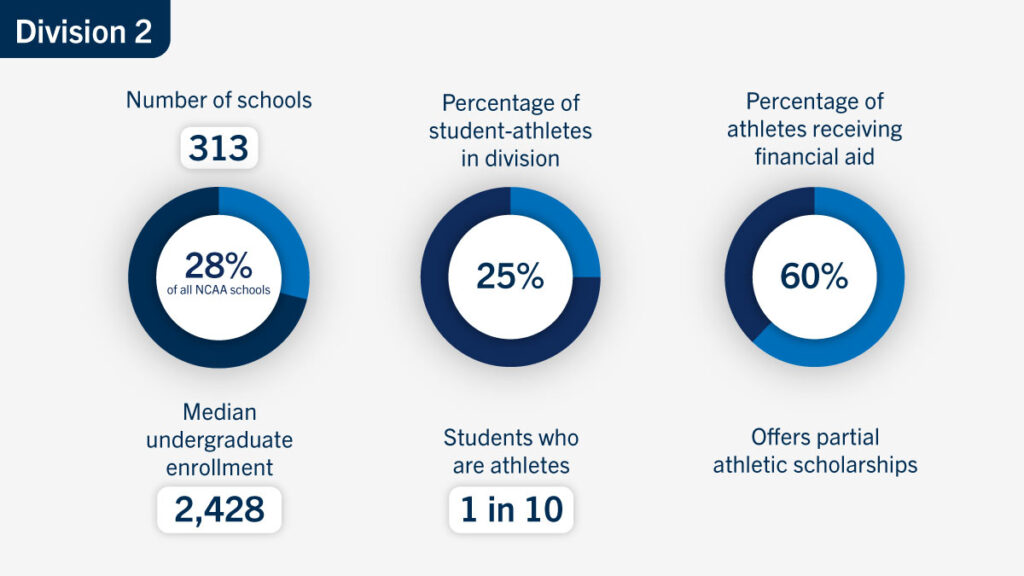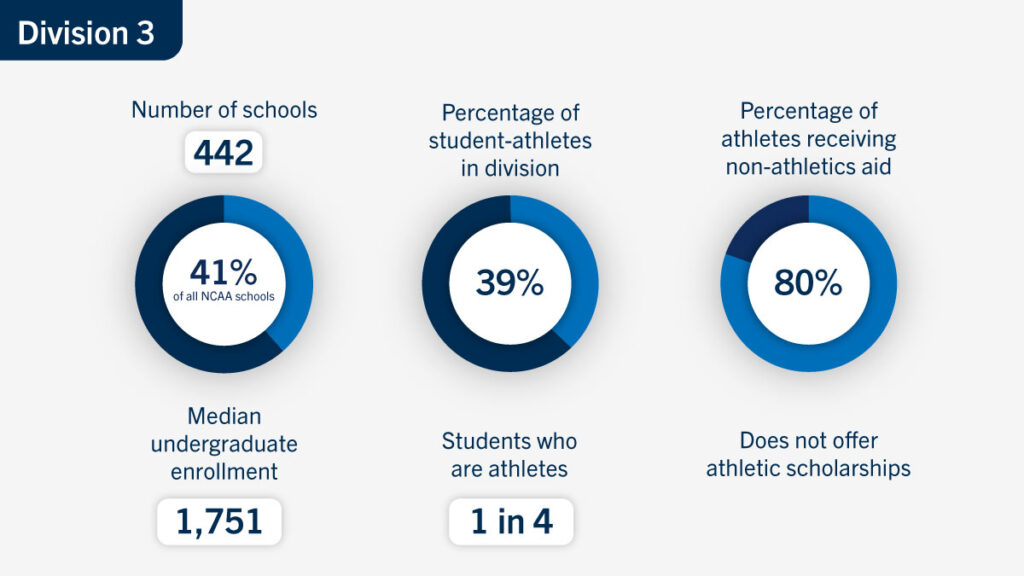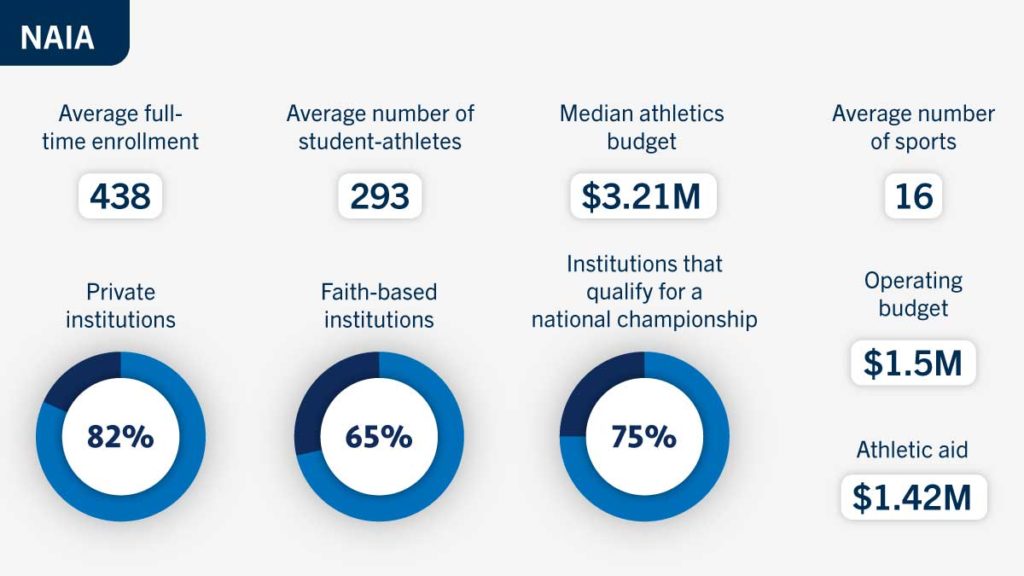If you want to know all about the NCAA and college divisions, including the main differences between them, you’ve come to the right place.
Watch the video below for a simple breakdown or read on for more information.
On This Page
How many NCAA divisions exist?
The NCAA has three division levels: Division I, Division II, and Division III.
According to the NCAA, there are 352 Division 1 schools, 313 Division 2 schools, and 434 Division 3 schools.
To give you a better idea of the size and how these college divisions compare, about 190,000 student-athletes compete at the Division 1 level. More than 130,500 student-athletes compete in Division 2 and Division 3, with just over 119,000 student-athletes on its various rosters. And that’s just the NCAA divisions.
Student-athletes and parents should note that for the small percentage of high school athletes that end up playing at the D1 and D2 level, only about 57 percent of D1 athletes receive some type of athletics aid and D2 athletes fare just a little better at 60 percent that get athletics aid.
Division I: Your sport, your life

There are many reasons athletes try for Division 1 colleges. Who wouldn’t want to compete at a large university in front of big crowds against some of the best athletes in their sport?
But playing in a D1 sport is not all glory. Training and practices take up most of your time. You won’t be able to have a part-time job, an internship, or vacation during spring break. You may even be volunteering when you’re not training, practicing, or studying.
Every moment of your day is accounted for. Many athletes stay on campus during the summer and take their most challenging classes then because they can devote more time to them. Some student-athletes feel separated from their classmates because they aren’t training as heavily as they are.
You live, breathe, and sweat your sport because that is what it takes to compete at the D1 level.
If you’re interested in D1, view NCSA’s list of the Best NCAA Division 1 College for student-athletes.
Division I and the Ivy League 8
Some of the country’s oldest and most prestigious schools make up the Ivy League. They include:
- Brown University
- Columbia
- Cornell
- University of Pennsylvania
- Harvard
- Princeton
- Yale
- Dartmouth
They rank among the top 20 NCAA Division 1 schools within the NCSA Power Rankings. And according to the NCAA, more than 8,000 student-athletes compete every year for these schools.
Most choose the Ivy League for its ultra-high level of competition in both athletics and academics. If an Ivy League school is on your target list, note that these schools do not award academic or athletic scholarships.
Financial aid is based on needs determined by the financial aid office at each school. Some schools will change their financial aid options yearly based on your grades and sports performance.
What is a D1 athlete?
A Division 1 (D1) athlete is a student-athlete who participates in a college sports program that is a member of the NCAA Division 1. Division 1 is the highest level of college sports competition in the United States and includes many of the largest and most well-known universities and athletic programs. If you are on the roster of a Division 1 team, you are a Division 1 athlete.
What is D1? What does D1 mean?
D1 stands for Division 1. Division 1 programs offers the highest level of competition between the NCAA’s three divisions. It is the toughest division to get into and compete in.
How many D1 schools are there?
There are 352 NCAA D1 schools across the U.S. Division 1 schools have the largest athletic budgets and provide more scholarships compared to the other division levels.
Division II: A more balanced approach

If you want a more balanced approach to college, consider a D2 program. Being a Division 2 athlete also requires a lot of training and practice, but less than D1.
There are still the demands all student-athletes face, but it is not as intense and rigorous as the year-round total commitment of a D1 athlete.
Additionally, you’re more likely to be rewarded with aid. 60% of D2 athletes receive athletic aid.
If you’re interested in D2, view NCSA’s list of the Best NCAA Division 2 College for student-athletes.
Division III: A well-rounded college experience

D3 is slightly different from D2 and D1. One difference is that all D1 and D2 athletes must meet specific eligibility requirements set by the NCAA. In Division 3, each school sets eligibility requirements instead of the NCAA.
Regarding scholarships, D3 students receive non-athletics aid through grants and needs-based scholarships. But that doesn’t mean they don’t do well. Approximately 87% of D3 athletes graduate from college within four years.
If you want to focus on academics as much as your sport, a D3 program is your best bet. This doesn’t mean you don’t train or practice. But it’s less demanding and intense than it would be at a D1 or D2 school. Academics are just as important as athletics in a D3 school.
A D3 program offers you a more well-rounded college experience. You’ll have a better chance to make friends outside your sport and feel more connected to your classmates.
View NCSA’s list of the Best NCAA Division 3 Colleges for student-athletes.
Watch the video below to compare all divisions.
Why an NAIA school might be your best bet

The National Association of Intercollegiate Athletics (NAIA) has been around longer than the NCAA. With 250 primarily private, smaller schools, more than 60,000 student-athletes compete at NAIA colleges in various popular sports for the 2022-23 academic year.
Many consider NAIA to be on par with NCAA D3 schools regarding life/sport balance and level of competitiveness. The NAIA awards close to $1.3 billion in athletic scholarships every year. That, along with more aggressive recruiting, is driving more talent to these schools and increasing competition. Today, top-level NAIA schools are like competing on an NCAA D2 team in terms of competition level.
If you want to play sports and have a chance to do well in college, the NAIA may be your choice.
Learn more about the NAIA and how it differs from the NCAA below:
Read more: NAIA Schools: What You Need to Know
NJCAA: Don’t ignore junior colleges
Junior colleges (JUCOs) are often missed in the college recruiting conversation, but they offer real value—both academically and athletically. Over 60,000 student-athletes compete in 28 sports at 500+ NJCAA schools each year.
JUCO can be a smart move for athletes who want to:
- Save money: Lower tuition and generous scholarship opportunities make JUCO an affordable start.
- Stay competitive: Many athletes earn immediate playing time and develop skills that prepare them for four-year programs.
- Stay on track: JUCOs offer general education and remedial classes that transfer easily, helping athletes stay academically eligible.
- Boost recruitment chances: Coaches often see JUCO athletes as more experienced and college-ready than high school recruits.
For more on how JUCO fits into the bigger recruiting picture, check out our full guide: Junior College Sports Explained.
Read more:
How to gauge your talent to find your best division
One of the first steps in the recruiting process is to accurately gauge your talent level and get an understanding of the divisions you might be suited for athletically. However, each day, we talk to athletes who don’t have a good grasp on what’s realistic for them.
And we get it! It’s tough to predict what level you’ll be at in three or even two years. The good news: There are plenty of ways to figure out where you stand athletically. The bad news: It’s still going to require that you honestly evaluate yourself. Let’s check out some of the best ways to get a better understanding of your true athletic talent.
Watch college games at every division level
Watch college athletes closely and compare your current skill level to the competition. If you can, visit local schools and universities and see it live. And be realistic! If you need to improve drastically to get some playing time on a team, check out a game at a different division level and see how you compare.
The head baseball coach at D3 Webster University Bill Kurich explained during a panel discussion,
Go watch a Division 1, a Division 2, a Division 3, or an NAIA game. One of the best things I did—I played at Quincy University—I went and watched them play. I sat in the stands and said, ‘You know what, I can play here; I can do this.’ I also went and saw Illinois State play the University of Northern Iowa when I was in high school, and I thought, ‘Well, maybe not.’ Not that I wasn’t as good, but I wasn’t going to play… And I knew I wanted to play every day.
When you’re watching a game, ask yourself these questions to help you figure out if this is the right level for you:
- Could you compete with these athletes today? If not, are you on track to be at that level as a senior?
- Would you get playing time if you joined this team? Is playing time important to you?
- Can you picture yourself competing on this team and for this school?
Review rosters of schools at different division levels
There’s a lot of helpful information you can get from a college sport’s roster. To find it, go to the school’s website and find the roster of current team members. Typically, you can find it by searching for the athletic program and then your specific sport. Each athlete will most likely have a short bio that talks about their high school and collegiate accomplishments. Here are a few key things to look for:
- Check out the body types of the athletes in your position. How do you stack up to their posted heights and weights?
- Are you competing in the same tournaments and showcases as the current athletes?
- Review their list of high school accolades (e.g., All-State, All-City, team MVP or captain), and consider how your current compilation of accolades compares.
- For individual sports like track & field, swimming, etc., pay particular attention to the athletes’ current stats. Compare that to your current numbers
Keep an open mind as you’re looking through schools’ rosters. If you never imagined yourself competing at a D3 school—but those are the athletes who most resemble you—it’s worth it to continue investigating what that division has to offer.
Hint: There are countless benefits to attending a D3 school. Learn more about D3 colleges and universities.
Get evaluated by a third party
In many cases, it can be difficult to objectively evaluate yourself. Especially on something as personal as your athletic talent. That’s where third parties come into play. Experts can either evaluate you in person or via your highlight film. Make sure your highlight film is up to date.
You can ask your current high school and/or club coach to evaluate your talent level. Recruiting experts like us can also help. NCSA College Recruiting evaluates athletes in 35 different sports.
Another avenue to investigate is evaluation camps. As the name indicates, they are camps for camps in which coaches help high school athletes gauge their talent and give them improvement suggestions.
When getting a third-party evaluation, here are a few questions to ask the evaluator:
- What level do you think I could compete at right now?
- How much would I need to improve to get to the next level?
- What are my strengths? What weaknesses should I work on?
Compete against elite athletes
Some high schools and clubs compete against tough teams who notoriously turn out college athletes. For athletes who already compete against the elite, every game is an opportunity to level set and see how they compare to other athletes in their recruiting class.
Some athletes play for smaller teams and don’t necessarily get a chance to compete against other college-bound athletes. If that’s the case for you, find camps, showcases, summer leagues or club teams to play against the best high school athletes.
How to decide which Division is best
Getting a better understanding of your talent is a great place to start when figuring out your best school. However, don’t forget that a great match is about where you fit athletically, academically, and socially. You may have the talent to compete at the Division 1 level, but that doesn’t mean that will be the best fit for you academically and socially. Keep all three factors in mind as you build your target list of schools, visit campuses, and do your research.
If you need more help, an NCSA Recruiting Coach can be an invaluable asset. Start by creating a free profile or schedule an assessment today!